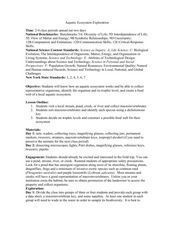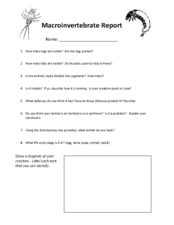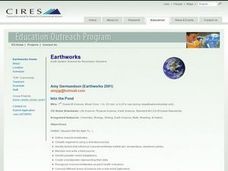Curated OER
That's Predictable - Stream Side Science
Research the impact that changes in biotic or abiotic factors might have on an ecosystem. Debate for or against the changes and take action in the community. This resource ideally follows stream studies that young ecologists may have...
Curated OER
Missing Macroinvertebrates - Stream Side Science
Field study groups collect samples of stream water and identify the macroinvertebrates found. Using their data, they calculate a water quality index to rate the health of the stream. They graph their data and discuss the value of a water...
Curated OER
Stream Consciousness
Actual stream water is analyzed in this environmental science activity. Participants measure water temperature and pH, and then survey the macroinvertebrates living in their samples. The data worksheet, troubleshooting tips, and...
Curated OER
Wetland vs. Stream Macroinvertebrates
A link to a comprehensive macroinvertebrate guide gives you the information needed to prepare for this field study activity. Sample macroinvertebrates are collected from areas representing different environmental conditions. Junior...
Curated OER
Invasives and Macroinvertebrates
Students view macroinvertebrates, or discuss previous collection activity. They graph data on macroinvertebrates in the Hudson River. Students discuss the relationship between habitat, environmental changes, and invertebrate diversity or...
Curated OER
Aquatic Ecosystem Exploration
Students visit a local stream, pond, creek, or river and collect macroinvertebrates. They sort macroinvertebrates and identify each species using a dichotomous key. Students decide on trophic levels and construct a possible food web for...
Curated OER
Macroinvertebrate Report
In this macroinvertebrates practice worksheet, 5th graders answer 8 questions about this type of animal. Students must also draw a diagram and label the parts of their macroinvertebrate.
Curated OER
Water Wonders
Students explore hydrology concepts. In this environment and biology instructional activity, students identify and describe macroinvertebrates using a variety of pictures and resources. Students observe and write about a classroom...
Curated OER
Leaf Pack Study
Students conduct an experiment using leaf packs. In this leaf lesson plan students complete an activity in groups and complete a handout.
Curated OER
Freshwater Macroinvertebrates
Students identify and count Macroinvertebrates at a Hydrology website. For this macroinvertebrates lesson students collect, sort and identify Macroinvertebrates.
Curated OER
The Impact of the Physical Environment on Stream Macroinvertebrates
Students explore the relationship between leaf packs in streams and macroinvertebrate populations. They experiment with hand exposure to stream macroinvertebrates in natural leaf packs and then make leaf packs of their own. The...
Curated OER
Oxygen Levels and Aquatic Plants and Animals
Learners design an experiment to test the effects of a change in the amount of dissolved oxygen of water on aquatic plants and animals. Questions are offered for exploration and experiment design. Results are tabulated and conclusions...
Curated OER
A Limnology Study of Drainage Ditches
Students chemically test water, observe microscopic organisms in the classroom, and screen the sample for macroinvertebrates. They design a reporting sheet that list all the items to be tested and a space to record the results.
Curated OER
Macroinvertebrate Simon Says
Students study the four groups of macroinvertebrates. In groups, they explore the characteristics of macroinvertebrates. Through playing a "Macroinvertebrate Simon Says" game, students discover the adaptations of the animals and their...
Curated OER
Build A "Bug"
Students brainstorm different adaptations that bug would need to live in aquatic environment, and watch presentation where classmate is dressed up in costume to represent adaptations necessary for macroinvertebrate to survive in water.
Curated OER
Who Lives In The Water
Students investigate the environment of a stream or lake to collect and observe macroinvertebrates in their natural environment. They record data and summarize the information obtained. Students look to see if there has been any human...
Curated OER
Missing Macroinvertebrates
Students investigate the concept of a macroinvertebrate. They observe the presence of increases or decreases in population in order to test for factors that contribute to the extinction of a species. Students predict the likelihood of...
Curated OER
Dissolved Oxygen
Students discuss the relationships between dissolved oxygen in a stream, stream temperature, organic waste loads, and stream conditions by studying and using a model of dissolved oxygen in the stream.
Curated OER
Draw your Conclusions
Students analyze data from a student discussion website and write a report on the outcome of an investigation regarding their local water quality. As part of a larger unit students then post the summary of their investigation on the...
Curated OER
Build a Bug
Learners design an ideally adapted macroinvertebrate to live in a water habitat. They illustrate their animal, name it and specify the adaptations it has that enable it to survive.
Curated OER
Into the Pond
Seventh graders use a pond to explore macroinvertebrates and other organisms. They use a dichotomous key to classify the organisms and maintain a journal recording their findings.
Curated OER
Determination of Overall Water Quality Using a Quantitative Macroinvertebrate Survey
Young scholars examine water samples from a local stream. They identify various types of macroinvertebrates found in that water ecosystem and perform a quantitative macroinvertebrate survey to determine the stream's water quality.























